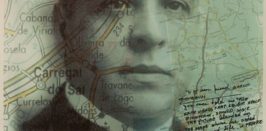Baruch Tenembaum
On April 3, 1954, Aristides de Sousa Mendes, a Portuguese diplomat and hero of the Second World War directly responsible for having saved the lives of tens of thousands of people persecuted by Nazism, passed away.
His rescue actions at the beginning of World War II were emulated by diplomats from different parts of the world. Among others, the Swedish Raoul Wallenberg in Budapest, the Chilean María Edwards de Errázuriz in France, and the Apostolic Delegate in Istanbul, Angelo Roncalli, who in 1958 was elected Pope and took the name John XXIII.
I prefer to be with God against men than with men against God, he used to say, being a devout Catholic.
In the spring of 1940 Sousa Mendes was the Consul General of Portugal in Bordeaux, France, when the Nazi “blitzkrieg” (lightning war) ran over the French defenses in Sedan, on May 14.
A multitude of refugees of various nationalities, including thousands of Jews, arrived in the French city hoping to obtain a transit visa to Portugal and then travel to America.
Despite the directives of the government of the Portuguese dictator António de Oliveira Salazar, prohibiting the issuance of visas to Jews expelled from their countries of origin, Sousa Mendes issued thousands of transit permits not only in Bordeaux but also in Bayonne and in the streets of Hendaye, on the border with Spain. Thanks to his actions, around thirty thousand refugees received help, among them ten thousand Jews who avoided certain death in the gas chambers.
I will give a visa to anyone who needs it, whether or not they can afford it. I will act in accordance with my conscience as a Christian, he would repeat to anyone who would listen to him.
For disobeying Oliveira Salazar, Sousa Mendes was expelled without benefits from the Portuguese Foreign Service and the mention of his name was forbidden for decades in Portugal. He lived the rest of his days as an outcast, lost his home and died in absolute poverty on April 3, 1954. Only in 1987 did President Mário Soares grant Sousa Mendes the Order of Freedom and publicly apologized to his relatives for the injustices committed.
To celebrate his life and heroic deeds, Peter Malkin, the man who captured Adolf Eichmann in Buenos Aires in 1960, made a portrait of Sousa Mendes, exhibited today at the Raoul Wallenberg Foundation headquarters in New York City.
In 2017, in a memorable speech on International Holocaust Day, António Guterres, Secretary General of the United Nations, said: The Holocaust witnessed great acts of heroism, from ordinary people who protected others to diplomats who, at serious risk to themselves, resisted the Nazis and helped thousands of people escape certain death. Some of these are well known: the Swedish Raoul Wallenberg and the Japanese Chiune Sugihara. Others, less so: the Iranian Abdol Hossein Sardari and, I am proud to say, the Portuguese Consul in Bordeaux, Aristides de Sousa Mendes. Today we need to deepen that spirit of solidarity. That is the best way to honor the victims of the Holocaust that we will never allow to be forgotten.
Baruch Tenembaum is the president of the Raoul Wallenberg Foundation

